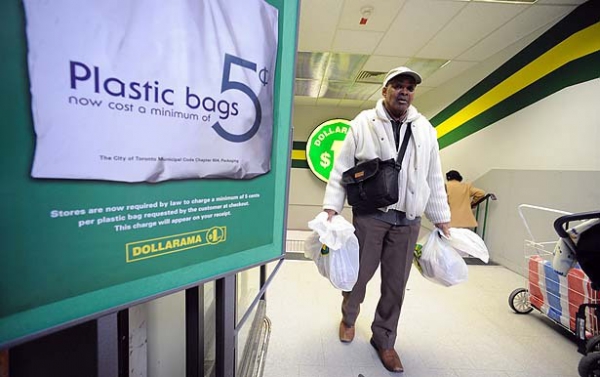
--
The New York City Council has renewed its push to impose a fee on plastic and paper bags at the grocery store, with many members coming out in favor of reusable shopping bags as an alternative. The original proposal, filed two years ago, would have imposed a 10-cent-per-bag fee on every plastic and paper grocery bag. Bill sponsors Councilman Brad Lander (D-Brooklyn) and Councilwoman Margaret Chin (D-Manhattan), are considering a number of options, including one that will cut the fee in half to 5 cents, making it more affordable.
The original proposal came close to passing, but was not supported by the Speaker, Melissa Mark-Viverito, or the mayor. The reduced fee, on the other hand, is generating some interest and may have a much better chance of passing and becoming law.
Councilman Alan Maisel (D-Brooklyn) said that he proposed cutting the fee in half several months ago. “I thought 10 cents was way too much,” the council member said, adding that his constituents would still not be happy with a 5-cent charge, but he recognizes that plastic bags are an environmental disaster.
Opponents of the bill have called it a “regressive tax” that will hit low-income families the hardest and serve as less of an incentive for New Yorkers to turn to reusable shopping bags. Councilman James Vacca (D-Bronx) said he’s against even a 5-cent fee, reasoning, “It’s not going to hit people who have a lot of money, who get Fresh Direct delivery.”
Council member David Greenfield (D-Brooklyn) also believes that the fee is a regressive tax, stressing that New Yorkers buy groceries in bulk. He says his concerns are pragmatic. “No one’s going to carry 30-40 reusable shopping bags to the store each week,” he said. He believes that the fee could cost middle and low income families up to $200 annually.
A spokesperson for LA POP DESIGN, distributors of a line of reusable shopping bags, notes that reusable shopping bags hold more items than single-use bags, so no one has to carry 30-40 reusable bags. The company’s bags also come with their own attached carry pouches, and fold into a compact size that fits into purses and glove compartments, making it even easier to keep them handy for shopping trips.
Council member Antonio Reynoso (D-Brooklyn) points out that people who pay for their purchases with SNAP or WIC do not have to pay the fee, and that the bill also contains provisions to give away reusable shopping bags throughout the city for free, especially in low-income neighborhoods.
“Remembering to bring reusable bags is easy once you get used to doing it,” Reynoso said. “My mother brings hers when she goes shopping now, and other people can learn to do it, too. These bags are a burden on our environment. This will be a small change that will make a big difference.”
Ya-Ting Liu, program director for the New York League of Conservation Voters points out that a similar 5-cent fee in Washington, D.C. has reduced single-use bag consumption by 60 percent.
If a fee gets the consumer to pause for a second and think about whether or not you need that bag, he says, “…it’s a win for a greener city.”
Release ID: 94843

